Cyberbullying | Why Is It Important To Talk About Cyberbullying?
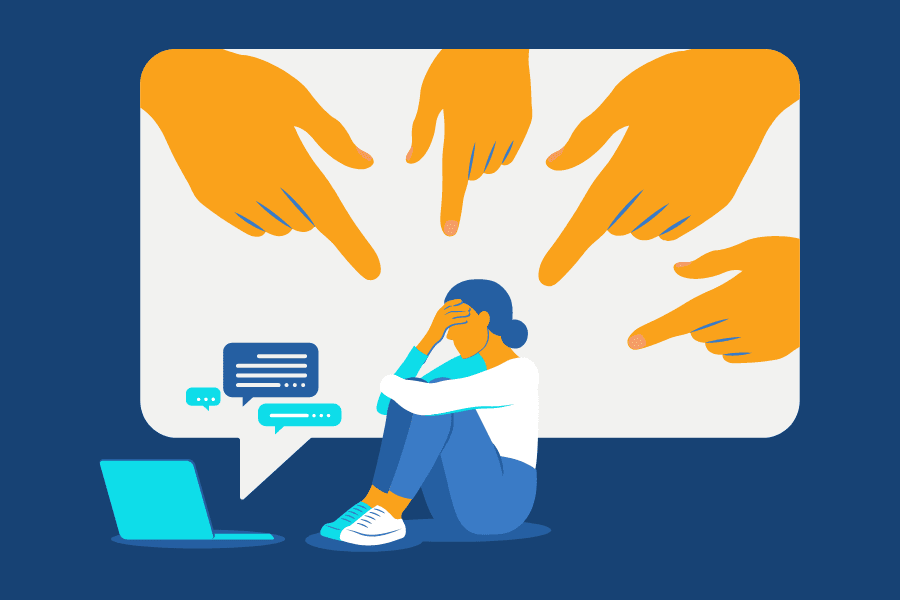

Cyberbullying involves sharing negative, harmful, or false content about another person.
This form of bullying can occur on devices like smartphones, tablets, and computers. A person may engage in cyberbullying through text, social media platforms, and even gaming.
With the increased use of technology and social media apps becoming extremely popular, cyberbullying has become a growing concern for teens and young adults.
According to the Centers for Disease Control, 15.7% of high school students in grades 9 through 12 reported being cyberbullied in 2019.
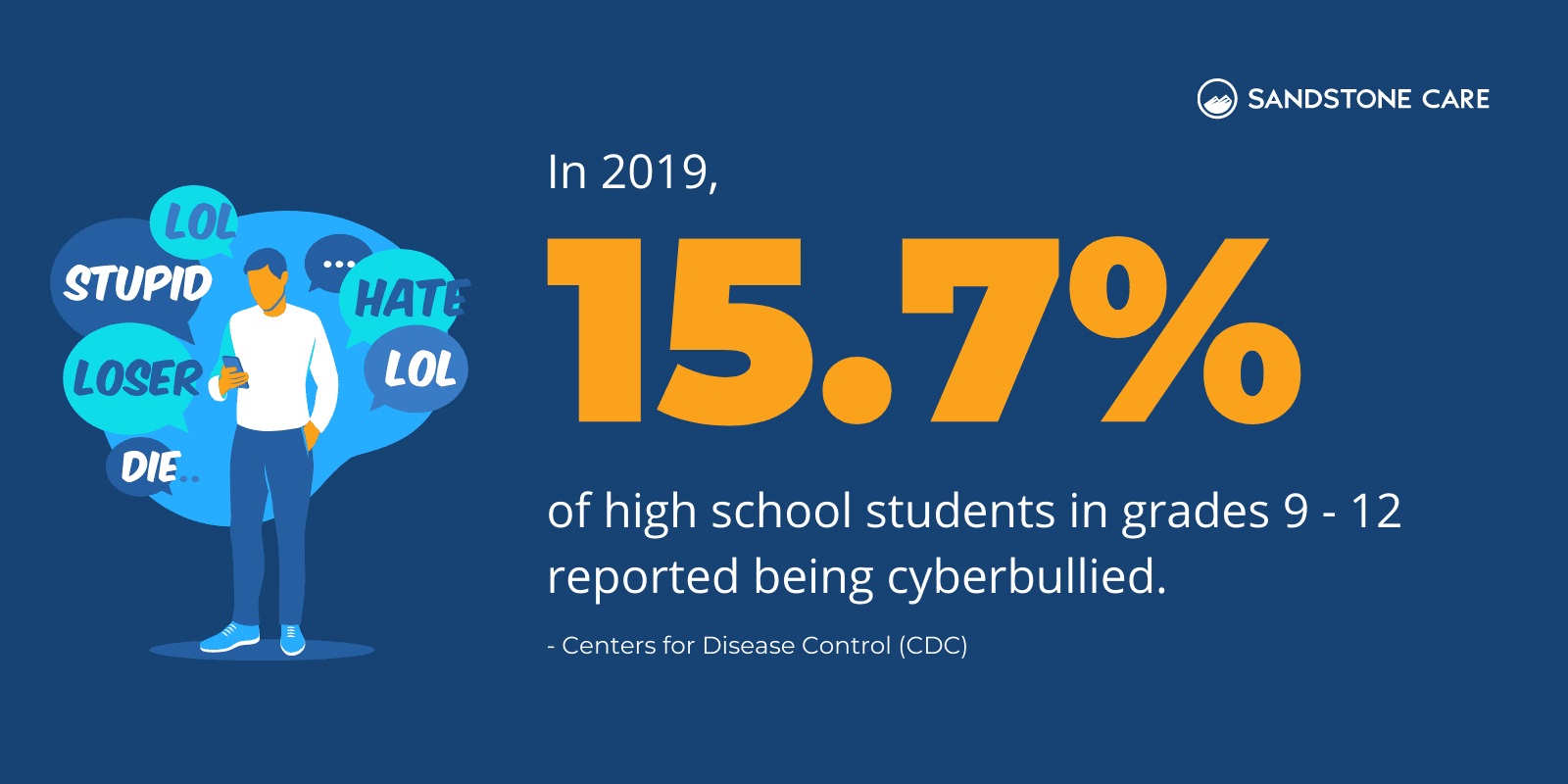
Common types of cyberbullying can include:
A common example of cyberbullying is leaving hate comments on social media.
A person may post a picture, and someone may comment something hurtful, negative, or embarrassing. Online harassment refers to repeated behavior used to harm or shame an individual.
Other common examples of cyberbullying can include:
According to Frontiers in Psychology, various theories have been used to predict cyberbullying perpetration.
Examples include the General Strain Theory, Routine Activities Theory, and the General Aggression Model.
Through theories like these, researchers can better understand how to prevent cyberbullying and determine which interventions are most effective.
Cyberbullying significantly impacts the teen and young adult population.
Research indicates a prevalence of cyberbullying participation that usually peaks between 12 and 15 years of age.
Many social media platforms now require that users be at least 13 years old as a means of privacy and safety.
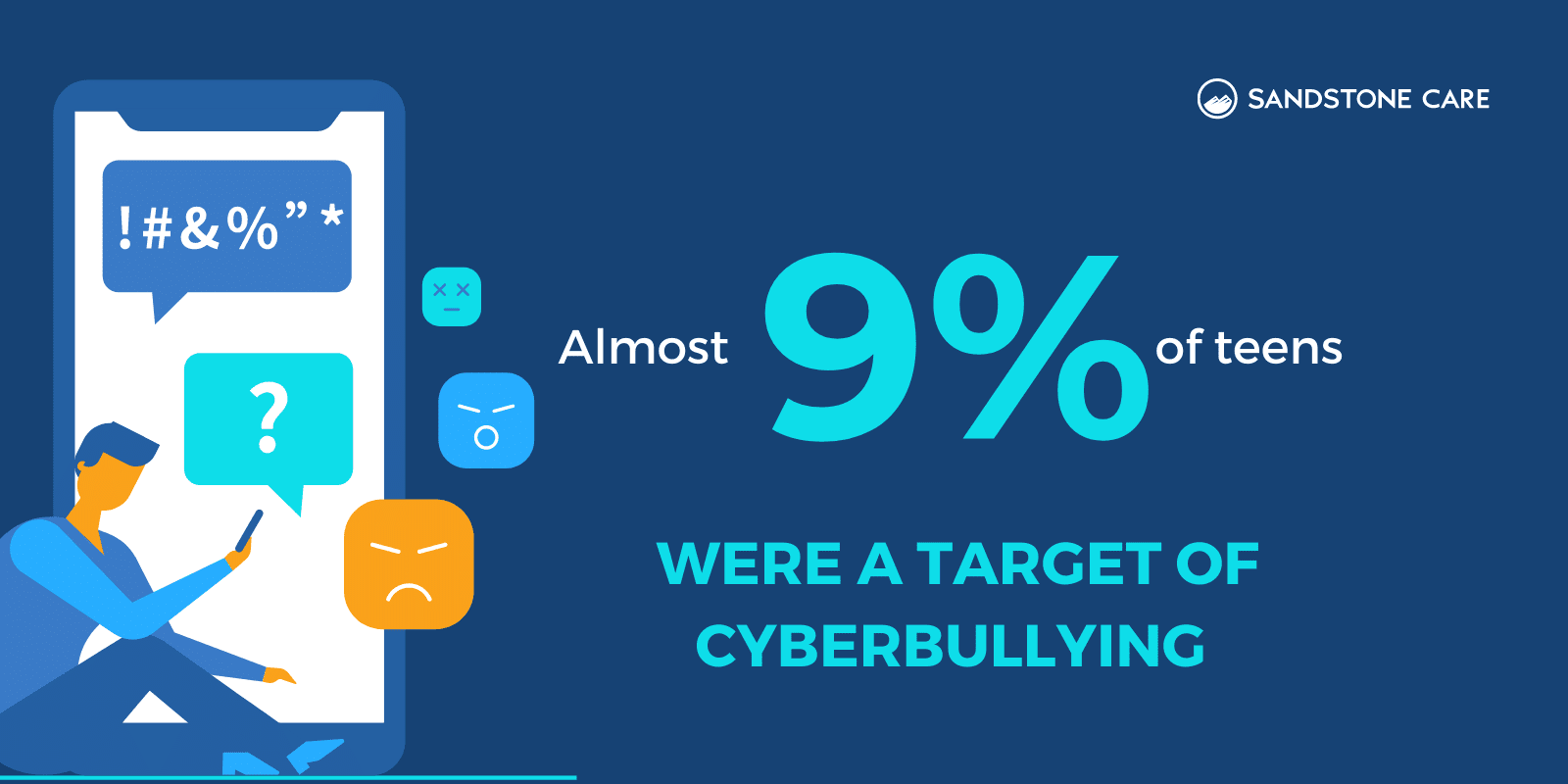
Warning signs of cyberbullying can include:

Cyberbullying can harm a person’s mental health.
Cyberbullying can bring large amounts of stress upon a person and make it extremely difficult to perform daily tasks and responsibilities.
Experiencing cyberbullying can also contribute to and worsen mental health disorders such as anxiety and depression.
Cyberbullying can affect a person’s self-esteem and self-worth, which can affect their school life, work life, personal life, and relationships.
Cyberbullying comes with many negative effects on a person’s life.
Cyberbullying can contribute to many mental health problems, putting young people at higher risk of anxiety and depression. Those who experience cyberbullying are also at higher risk of engaging in self-harm and experiencing suicidal thoughts.
Some forms of cyberbullying also become criminal and can turn into physical violence.
If you or a loved one are experiencing suicidal thoughts, you are not alone. Call 911 or the National Suicide Prevention Lifeline at 988.
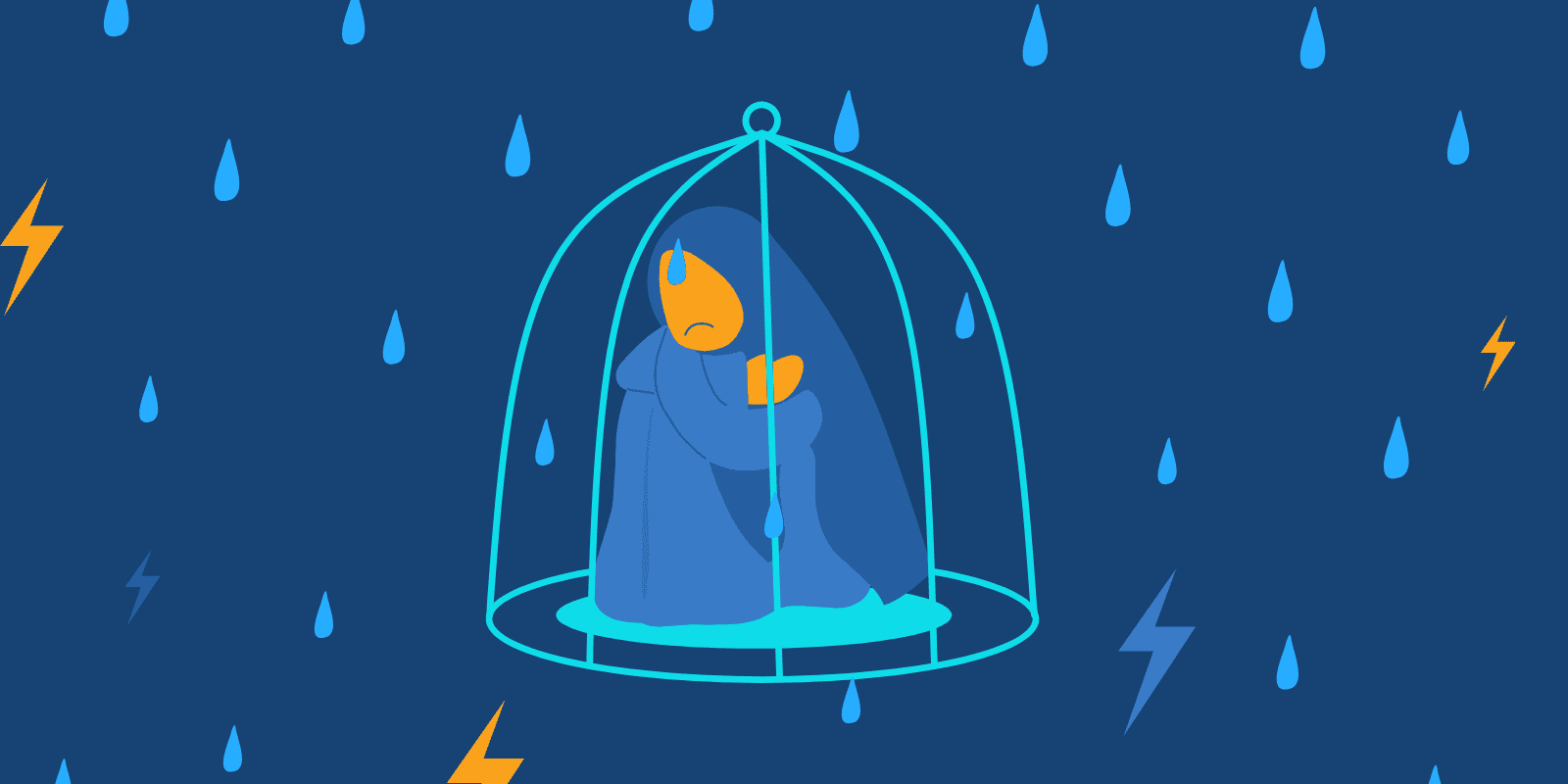
Those who experience cyberbullying tend to isolate themselves from their friends and family.
They often do not want to attend school and may experience great anxiety when they have to attend social events.
Human interaction and connections are extremely important to children’s and teens’ development.
Cyberbullying can negatively impact a student’s academic performance in ways that include:
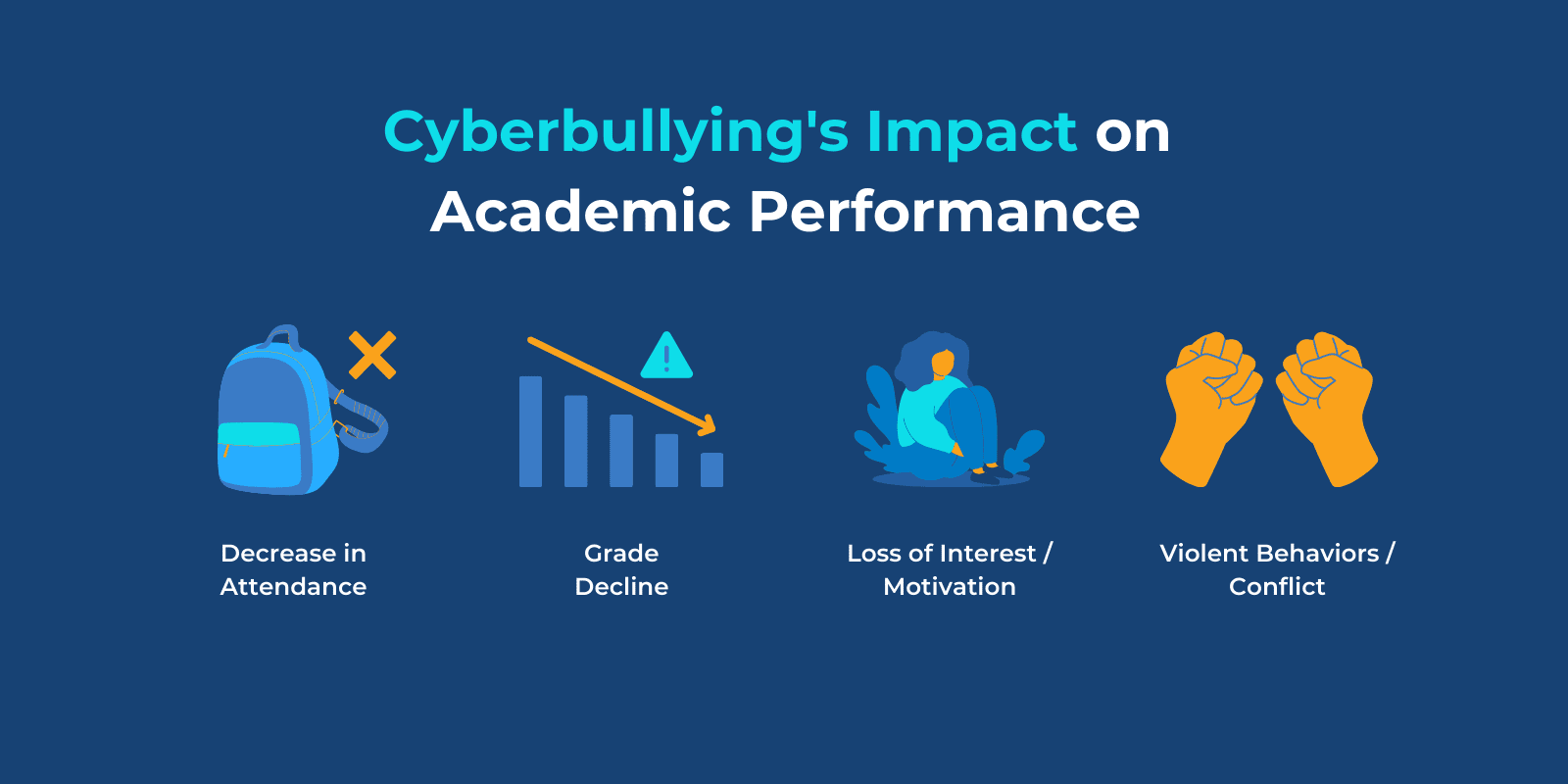
The stress caused by cyberbullying can impact a student’s both physical and mental health.
Cyberbullying can lead to depression, anxiety, anger, aggressiveness, and low self-esteem and affect a person’s concentration and focus.
When people who have been cyberbullied isolate themselves, they may also neglect their physical health.
According to the NIH, almost 9% of adolescents involved in a long-term study about brain development and child health reported being a target of cyberbullying.
Those who experienced cyberbullying were more than 4 times as likely to report thoughts of suicide and attempts compared to those who were not cyberbullied.
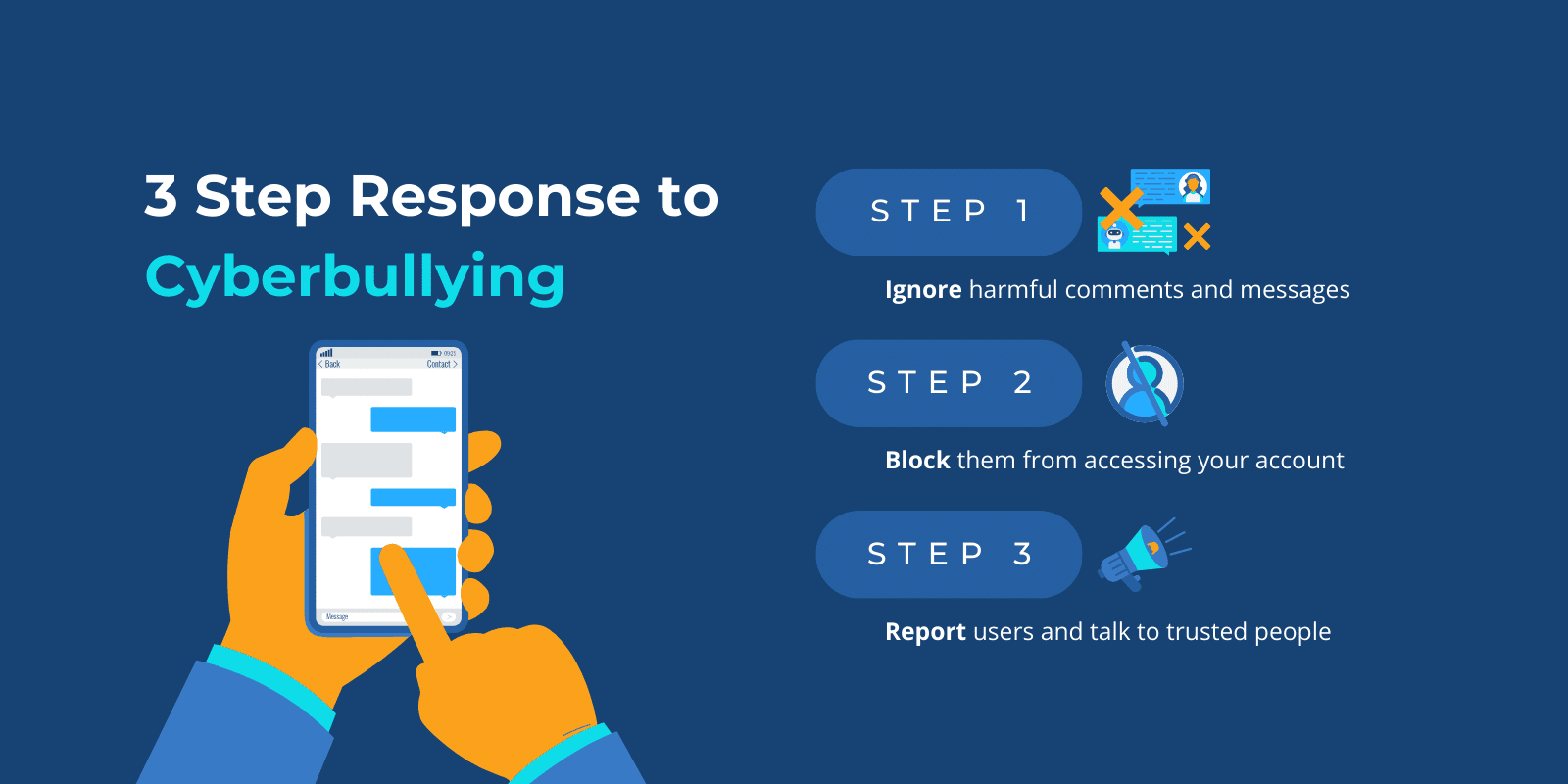
There are a few ways a person can respond to being cyberbullied.
One of the first ways is to ignore them. Some people are trying to get a reaction out of the person they are bullying, and if they see that you are not feeding into it or don’t care to respond, they may stop doing it.
However, a bully may continue to do so without quitting. In this case, there are other things you can do.
Another way to respond is by blocking them. If a person is leaving negative or hurtful comments, you can control who you allow accessing your page. By blocking them, you can prevent them from making any other comments.
If you do want to say something, you can be calm and respectful. You do not have to give in to negative behaviors for something to change. Doing so can show that you are not letting hate and negativity affect you and can possibly change someone’s perspective on their actions.
Sometimes a person may engage in cyberbullying because they are going through something difficult. While this is not an excuse, it can help you understand why a person is negative and show that it may not even have anything to do with you.
If a person is threatening you, it is important to report them and talk to a trusted adult, a parent, a teacher, a counselor, a family member, or anyone else that you feel comfortable going to.
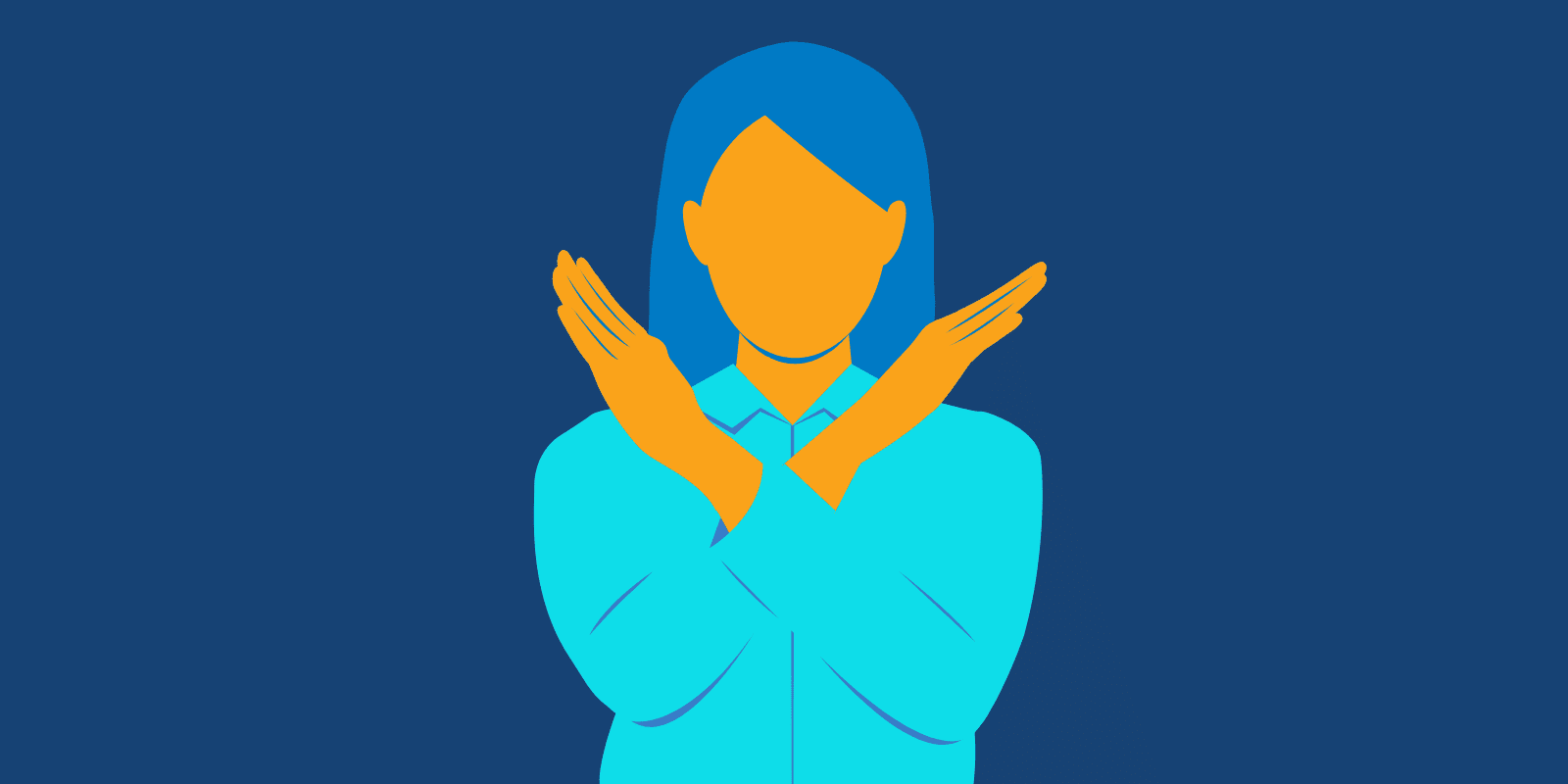
Most people who join online platforms like social media and gaming websites often just want to connect with their friends and enjoy their free time.
Some people may use the internet as a type of “escape,” where they go to get away from the stress of their lives, or as a way to relax and have fun.
Many people are on social media for good reasons; they don’t want any conflict or problems and don’t want to become a victim of cyberbullying.
Some ways a person can reduce and prevent cyberbullying include:
Some ways parents can prevent cyberbullying include:
One of the biggest parts of bullying prevention is being aware of what your kids are doing online. Having healthy communication with your teens can help you be aware of what is going on in your children’s lives and also establish rules and boundaries.

Those who become a victim of cyberbullying face negative effects on their mental health.
Dealing with cyberbullying can be extremely difficult for an individual and their loved ones.
Psychotherapy, also known as talk therapy, can help a person cope and understand the connection between thoughts, feelings, and behaviors.
Cognitive behavioral therapy (CBT) is a common form of psychotherapy that is used for a variety of different mental health disorders and substance use disorders.
Working with a therapist can help an individual learn healthy coping mechanisms for difficult emotions and teach a person life skills that they can use long after therapy is over.
It can be extremely difficult to find out your child is bullied online.
Know that you and your family are not alone and there is help out there.
Parents may wonder what they can do to help their teen who is being bullied.
An important way you can help is by listening to them and being there for them. Communicating about topics like cyberbullying may feel difficult or uncomfortable at first, but it is necessary to have to work through them.
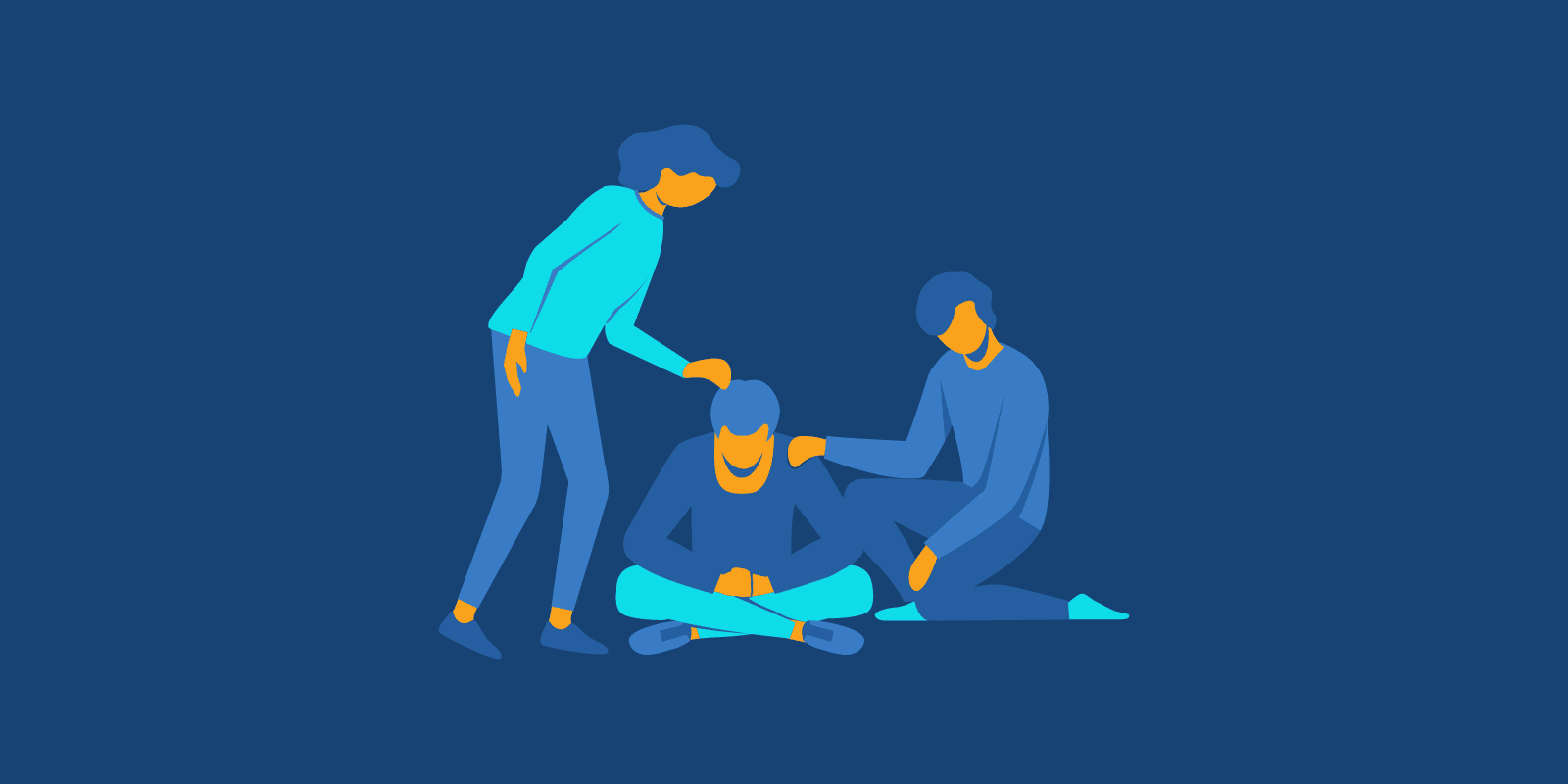
Educating yourself about cyberbullying, even if it isn’t happening to someone in your family, can be extremely helpful in learning how to prevent it and be prepared to know what to do if the time ever comes.
When you have a conversation with your teen, you can devise a plan together on how you will respond to the situation.
Depending on the individual and the circumstance, maybe the response involves blocking a person or calmly responding to them.
However, sometimes when a bully doesn’t stop, or the case is severe, it may call for the need to reach out to other resources. This could be contacting your teen’s school, reporting an account on social media platforms, or sometimes contacting the police.
It can also be helpful to take screenshots and document things that happen in case you have to report someone.
If your teen is being bullied online, it can be hard for the whole family. Being open with your child and making sure they feel safe to go to you for help is so important.
If a teen is struggling with their mental health because of online bullying, connecting them to treatment can help them begin to heal and learn how to cope healthily.
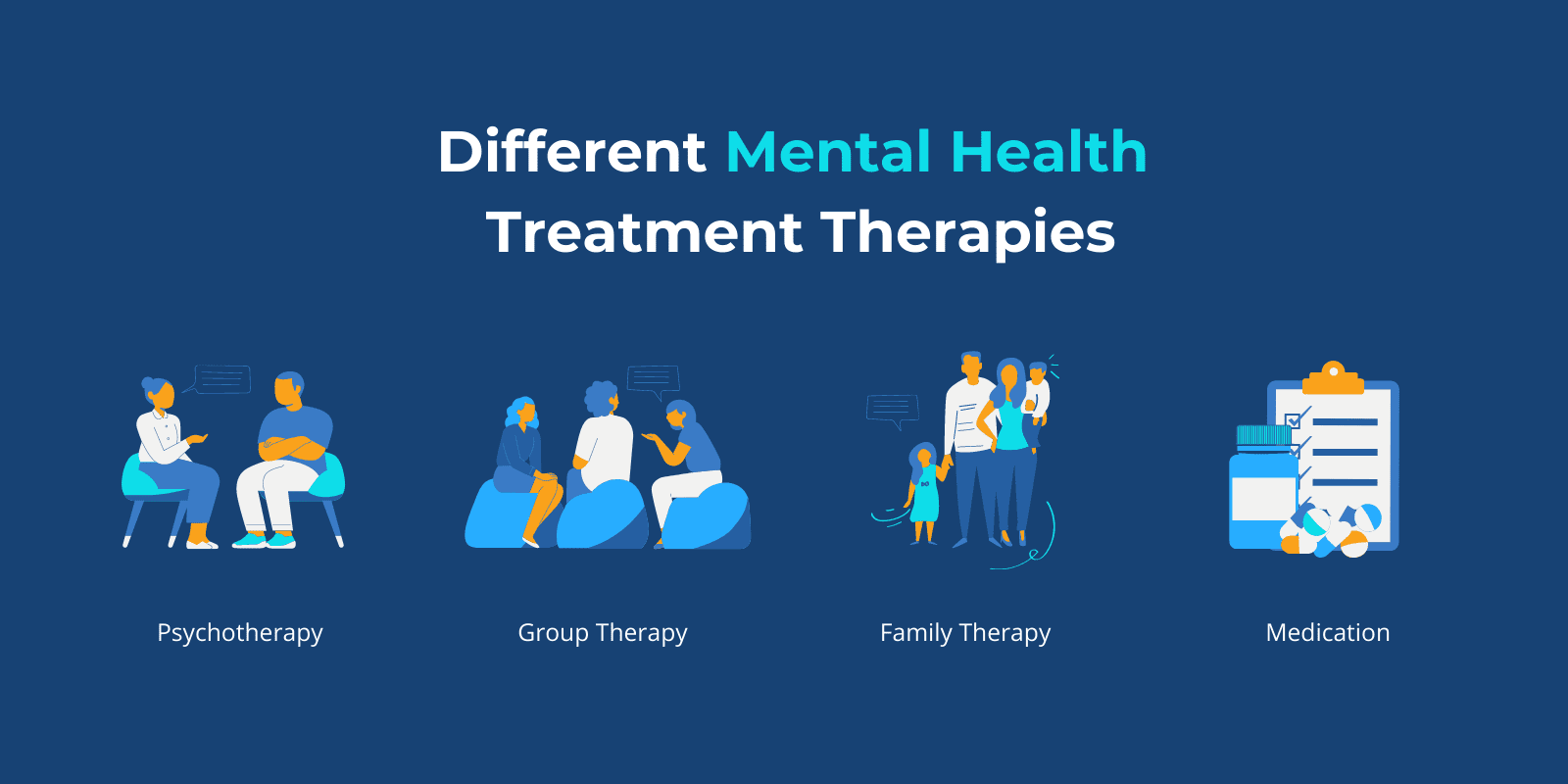
Cyberbullying is a very difficult experience, and different people may cope differently.
A person may directly react to the bullying. They may say something back to them, whether it be retaliation or feedback.
Another form of coping may be ignoring cyberbullying. A person may just avoid the situation entirely or not do anything about it.
An individual may also seek support from others to help them cope. They usually go to someone they can trust, whether it be a family member, friend, teacher, or anyone else they feel comfortable with.
Lastly, another coping mechanism can involve using technological resources such as blocking accounts.
FAQ
Our goal is to provide the most helpful information. Please reach out to us if you have any additional questions. We are here to help in any way we can.
The biggest problem with cyberbullying is that it can cause serious damage to a person’s mental health and well-being.
People tend not to take cyberbullying seriously because they may think of it as just words on a screen. The bullies are often unable to see the effects of their actions on others because they are not face-to-face with them.
Cyberbullying is a serious problem that can lead to irreversible damage. Many people who fall victim to cyberbullying have to deal with its impact long after the bullying has stopped.
Cyberbullying can really harm a person’s life, and young people have to face the consequences of others’ actions.
People cyberbully one another for several different reasons.
According to Stopbullying.gov, one factor that can impact why a person would cyberbully could have to do with their peers. They may bully to gain social power and feel accepted by a certain friend group, or they may be trying to fit in.
They may also be trying to control others or dictate who is part of their group and who is not.
Another factor can involve the family. If a person lives in an environment where there is bullying or violence, it can affect how they act outside the home.
A young person’s relationship with their parents greatly impacts their life. If a person has a parent who does not provide emotional support, who responds in an authoritarian or reactive way, or who has little involvement in their children’s lives.
A person may also bully because of emotional factors. They may have been bullied before or may struggle with low self-esteem, so they use bullying to make themselves feel better or more powerful.
While it is not an excuse, a person who cyberbullies is commonly going through something difficult in their lives, and they bully as a way to compensate for things that may not be right in their lives.
If your child or loved one has been a perpetrator of cyberbullying, there are ways you can connect them to help and teach them healthy coping mechanisms to help prevent bullying.
Bullying is extremely harmful.
Bullying must stop because it can hurt many aspects of a person’s life. It can affect their mental health, social life, education, physical health, and much more.
Whether it be online or in-person, bullying can lead to serious outcomes.
Individuals who have been cyberbullied are more at risk of engaging in self-harming behaviors or experiencing suicidal thoughts.
It is important for people, no matter their age, to understand how much power their words and actions can have on a person. Cyberbullying is something that can be stopped and should be.
At the state level, different anti-bullying laws exist to help protect elementary, middle, and high school students.
Some anti-bullying laws require that schools report, document, and investigate bullying within a certain number of days. Others may require schools to continuously update their anti-bullying policies.
Certain acts associated with bullying may result in several different consequences, such as expulsion, suspension, fines, or in some cases, criminal penalties.
Popular social media sites such as Youtube, Instagram, and Snapchat have a significant rate of cyberbullying cases.
Social media has been a major contributor to bullying cases in recent years. Those who bully use these platforms because they are so easily accessible, and they often do it while hiding their identities.
Cyberbullying takes place online rather than face-to-face.
With the rise of technology, cyberbullying became a problem because it gave people more places and platforms to say whatever they want very easily.
Some people may not take cyberbullying seriously because they are under the false impression that it is not as bad as being bullied in “real life.”
Some people may say things along the lines of “It’s just words” and use that as a way to make it seem that it is not a big deal.
Those who are bullies online often do not think of the severity of their actions because they are behind a screen. They don’t think they will ever get caught and often hide their identity to attempt to avoid consequences.
Moreover, cyberbullying is an extremely serious problem.
Cyberbullying can cause a great amount of harm to one’s health and well-being. Those who are cyberbullied are at a higher risk of developing mental illness that can quickly worsen.
Cyberbullying can hurt someone, and in severe cases, it can cause someone to experience suicidal thoughts. Cyberbullying can cost a life.
If you or a loved one are experiencing suicidal thoughts, call 911 or the National Suicide Prevention Lifeline at 988.


Social media and the rise of technology have been major contributors to cyberbullying cases among young people. Sandstone Care is here to support teens and young adults with mental health and substance use disorders.